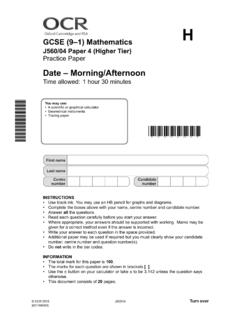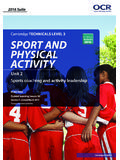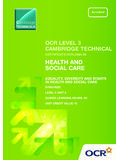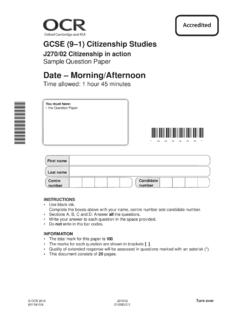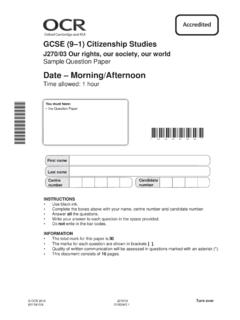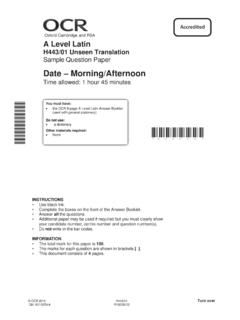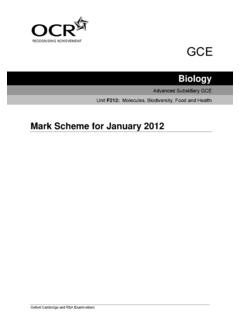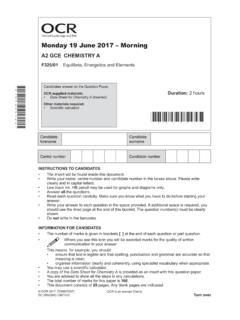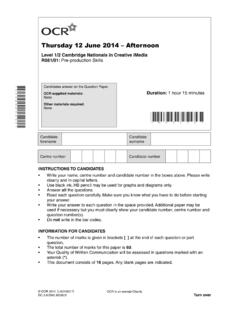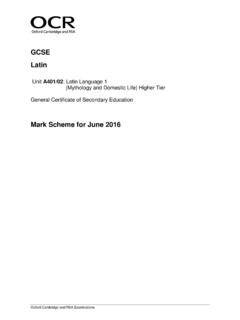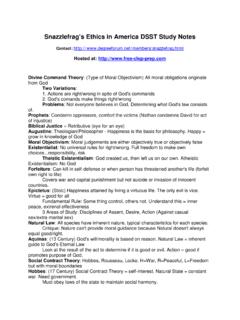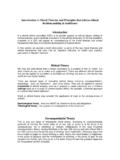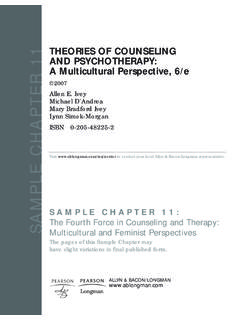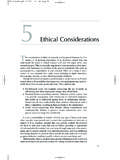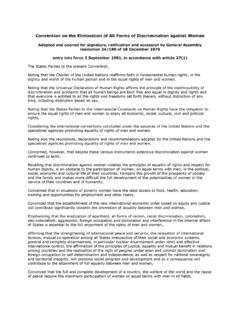Transcription of AS/A Level GCE - OCR
1 OCR 2013 QAN 500/2280/5 QAN 500/2199/0 AS/A Level GCE GCE Religious Studies OCR Advanced Subsidiary GCE in Religious Studies H172 OCR Advanced GCE in Religious Studies H572 version 4 September 2013 specification Contents 2 OCR 2013 GCE Religious Studies v4 1 About these Qualifications 4 The Two-Unit AS 6 The Four-Unit Advanced GCE 6 Qualification Titles and Levels 6 Aims 6 Prior Learning/Attainment 7 2 Summary of Content 8 AS Units 8 A2 Units 9 3 Unit Content 12 G571: AS Philosophy of Religion 12 G572: AS Religious ethics 16 G573: AS Jewish Scriptures 19 G574: AS New Testament 22 G575: AS Developments in Christian Theology 24 G576: AS Buddhism 27 G577: AS Hinduism 30 G578: AS Islam 33 G579: AS Judaism 36 G581: A2 Philosophy of Religion 39 G582: A2 Religious ethics 41 G583: A2 Jewish Scriptures 44 G584: A2 New Testament 46 G585: A2 Developments in Christian Theology 49 G586: A2 Buddhism 52 G587: A2 Hinduism 55 G588: A2 Islam 58 G589.
2 A2 Judaism 60 4 Schemes of Assessment 63 AS GCE Scheme of Assessment 63 Advanced GCE Scheme of Assessment 65 Unit Order 66 Unit Options (at AS/A2) 66 Synoptic Assessment (A Level GCE) 67 Assessment Availability 69 Assessment Objectives 69 Quality of Written Communication 70 OCR 2013 3 GCE Religious Studies v4 5 Technical Information 71 Making Unit Entries 71 Making Qualification Entries 71 Grading 71 Result Enquiries and Appeals 72 Shelf-Life of Units 73 Unit and Qualification Re-sits 73 Guided Learning Hours 73 Code of Practice/Subject Criteria/Common Criteria Requirements 73 Arrangements for Candidates with Particular Requirements 73 Prohibited Qualifications and Classification Code 74 Coursework Administration/Regulations 74 6 Other specification Issues 75 Overlap with other Qualifications 75 Progression from these Qualifications 75 Key Skills Mapping 76 Spiritual, Moral, Ethical, Social, Legislative, Economic and Cultural Issues 77 Sustainable Development.
3 Health and Safety Considerations and European Developments 77 Avoidance of Bias 77 Language 78 Disability Discrimination Act Information Relating to these Specifications 78 Appendix A: Performance Descriptions 79 Vertical black lines indicate a significant change to the previous printed version. 4 OCR 2013 GCE Religious Studies v4 1 About these Qualifications This booklet contains OCR s Advanced Subsidiary GCE and Advanced GCE specifications in Religious Studies for teaching from September 2013. This specification builds on the knowledge, understanding and skills that candidates may have developed through the study of GCSE Religious Studies. It does not, however, assume or require any previous study of the subject. It is designed to support a course of study which is suitable for candidates from any religious background (or none). At AS candidates select two complementary areas of study from the wide range permitted in the specification .
4 At A2 it is recommended that candidates continue to follow the same subject areas selected at AS. Candidates are free however to select different units at A2 than those studied at AS. In such cases it should be noted that candidates should familiarise themselves with the contents of the corresponding AS, as they may be disadvantaged by not studying the areas covered at AS. The specification , however, is designed to be flexible and does permit combinations of up to four different subject areas for the Advanced GCE qualification. As required by the Subject Criteria, the Advanced GCE specification includes synoptic assessment, in which candidates are asked to show their understanding of the connections between their chosen areas of study and other specified aspects of human experience. This is incorporated fully into the content of all A2 units. The specification incorporates: continuity of content in the areas of the Philosophy of Religion, Religious ethics , World Religions and Textual papers; flexibility in allowing combinations of up to four areas of study in the subject; maintenance of established methods of assessment: the need for candidates to answer questions at the full Advanced Level with essays which they must plan and structure for themselves; the practice of positive awarding, by which examiners are not restricted by a prescriptive marking scheme but are able to reward candidates for any valid response to a reasonable interpretation of the question according to its quality as measured against standard band descriptions.
5 The specification is linked closely with the OCR GCSE Religious Studies specifications, in both content and in progression of demand. In AS units, candidates are asked two-part structured questions which relate directly to single areas within the associated module. The questions help candidates to structure their answers to meet the Assessment Objectives. In A2 units, candidates are expected to display knowledge, understanding and evaluative skills in respect to the specified topics. They are asked essay-style questions in which they may be expected to use material from more than one area within the unit, to draw comparisons and to assess the relative significance of different aspects of the unit. The questions direct candidates towards the Assessment Objectives, but candidates are expected to select their own material and structure it themselves into a coherent answer.
6 OCR 2013 5 GCE Religious Studies v4 The AS GCE and Advanced GCE specifications require candidates to: Study one or more of the following areas within Religious Studies: philosophy of religion; religious ethics ; textual studies; theological studies; history of religious tradition(s). Candidates should acquire knowledge and understanding of: the key concepts within the chosen area(s) of study (eg religious beliefs, teachings, doctrines, principles, ideas and theories) and how these are expressed in texts, writings and/or practices; the contribution of significant people, traditions or movements to the area(s) studied; religious language and terminology; major issues and questions arising from the chosen area(s) of study; the relationship between the chosen area(s) of study and other specified aspects of human experience. Candidates should develop the following skills: recall, select and deploy specified knowledge; identify, investigate and analyse questions and issues arising from the course of study; use appropriate language and terminology in context; interpret and evaluate religious concepts, issues and ideas, the relevance of arguments and the views of scholars; communicate, using reasoned arguments substantiated by evidence; develop the skill of making connections between the area(s) of study chosen and other specified aspects of human experience.
7 In addition, the Advanced GCE specification requires candidates to: demonstrate a wider range and greater depth of knowledge and understanding, a greater maturity of thought and expression and more developed analytical skills. 6 OCR 2013 GCE Religious Studies v4 The Two-Unit AS The Advanced Subsidiary GCE is both a stand-alone qualification and also the first half of the corresponding Advanced GCE. The AS GCE is assessed at a standard appropriate for candidates who have completed the first year of study (both in terms of teaching time and content) of the corresponding two-year Advanced GCE course, ie between GCSE and Advanced GCE. From September 2013 the AS GCE is made up of two mandatory units chosen from nine options, which are externally assessed and form 50% of the corresponding four-unit Advanced GCE. The Four-Unit Advanced GCE From September 2013 the Advanced GCE is made up of two mandatory units at AS and two further units at A2, again chosen from nine options.
8 These A2 units are also externally assessed. Qualification Titles and Levels These qualifications are shown on a certificate as: OCR Advanced Subsidiary GCE in Religious Studies. OCR Advanced GCE in Religious Studies. Both qualifications are Level 3 in the National Qualification Framework (NQF). Aims The aims of these specifications are to encourage candidates to: develop their interest in and enthusiasm for a rigorous study of religion and relate it to the wider world; treat the subject as an academic discipline by developing knowledge, understanding and skills appropriate to the specialist study of religion; adopt an enquiring, critical and reflective approach to the study of religion; reflect on and develop their own values, opinions and attitudes in the light of their learning. OCR 2013 7 GCE Religious Studies v4 Prior Learning/Attainment No prior knowledge of the subject is required.
9 The specifications build on, but do not depend on, the knowledge, understanding and skills specified for GCSE Religious Studies. It is recommended that candidates have attained communication and literacy skills at a Level equivalent to GCSE Grade C in English. 8 OCR 2013 GCE Religious Studies v4 2 Summary of Content AS Units Unit G571: AS Philosophy of Religion Ancient Greek influences on philosophy of religion; Judaeo-Christian influences on philosophy of religion; Traditional arguments for the existence of God; Challenges to religious belief. Unit G572: AS Religious ethics Ethical theories; Applied ethics topics. Unit G573: AS Jewish Scriptures Time line of scriptures; Form criticism; Topics. Unit G574: AS New Testament First century Gospel setting; Themes and texts of Mark s passion narrative; The resurrection in the Synoptic Gospels.
10 G575: AS Developments in Christian Theology Foundations of Christian theology; Liberation theology. Unit G576: AS Buddhism Origins of Buddhism; Core concepts; Key teachings, attitudes and practices. OCR 2013 9 GCE Religious Studies v4 Unit G577: AS Hinduism Origins of Hinduism; Core concepts; Key teachings, attitudes and practices. Unit G578: AS Islam Background and origins of Islam; Beliefs; Practices. G579: AS Judaism Sacred writings; Beliefs; Practices. A2 Units Unit G581: A2 Philosophy of Religion Religious language; Experience and religion; Nature of God; Life and death; Miracle. Unit G582: A2 Religious ethics Meta- ethics ; Free will and determinism; Conscience; Virtue ethics ; Applied ethics topics. 10 OCR 2013 GCE Religious Studies v4 Unit G583: A2 Jewish Scriptures Reward and punishment; Amos and Hosea; Messianic hope and the ethical kingdom; Ruth; Wisdom literature and religious experience.
